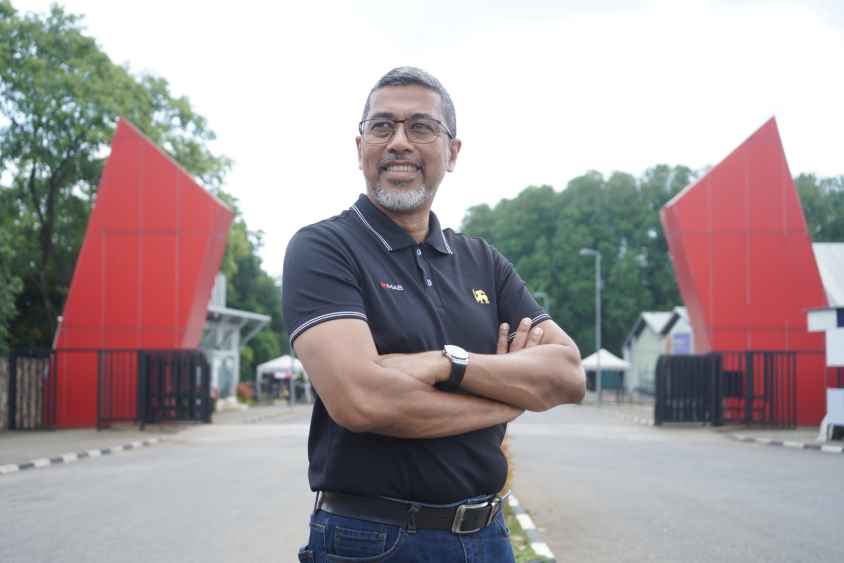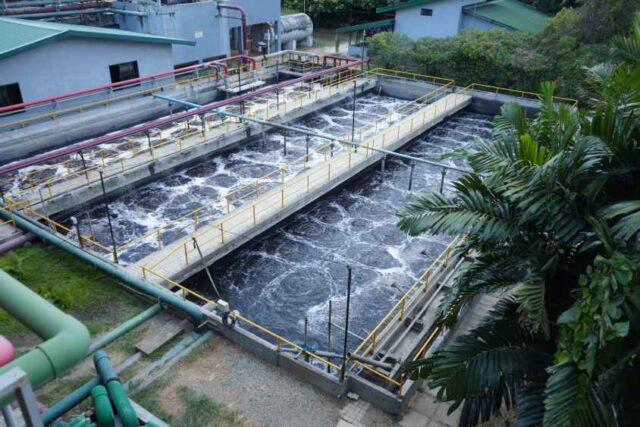
In an era where environmental sustainability is transitioning from choice to necessity, MAS Fabric Park (MFP) stands out as a revolutionary force in Sri Lanka’s apparel industry. Nestled in the tranquil environs of Thulhiriya in the Kegalle District in Sri Lanka, this 165-acre privately owned apparel-intensive free trade zone is not just a manufacturing hub; it’s the result of the MAS Group’s unwavering vision for sustainability, a testament to the Group’s dedication and a shining example of business harmonizing with the environment.
A Vision for Positive Change
MAS Holdings, the parent company of Fabric Park, has long embraced a vision of sustainable growth and positive transformation within the Company’s ethos, which is seen throughout the organization and its initiatives. The belief is that sustainability goes beyond profit; it’s about fostering positive change in the world, making a difference for the communities around the locality, and leaving a lighter footprint on our planet.
MAS Fabric Park’s CEO Murad Rajudin explained that MFP provides partner plants with centralized utility services including treated water, raw effluent treatment for factory-discharged water, energy in the form of electricity distribution from the main grid, steam, and thermic heat, based on the location of the plant. “MFP plays a pivotal role in the intricate supply chain of MAS Holdings. Firstly, it is a strategic hub for fabric development and value addition, contributing significantly to the vertical integration of the MAS supply chain. This integration is crucial in a global industry where speed, efficiency, and reducing carbon footprint have become paramount. By offering state-of-the-art infrastructure and facilities for fabric manufacturing right within Sri Lanka, MFP not only streamlines operations but also aligns with the global demand for responsible and sustainable manufacturing practices.”

Comprehensive Water Management, Waste Reduction, and Value enhancement
Sustainability is deeply ingrained in every facet of MAS Fabric Park’s operations, notably in its approach to IPZ’s overall water footprint management, centralized effluent treatment, and waste management operations. The Park introduced a uniquely designed centralized raw wastewater collection and combined treatment system, which strictly adheres to global-level Zero Discharge of Hazardous Chemicals (ZDHC) standards with respect to the fully treated discharges of the zone.
MFP General Manager (Hydro & Sustainability) Harsha Deraniyagala says, “MFP is leading the way in centralized water management systems, and centralized effluent treatment operations whilst meeting global standards with a present capacity of 9000 cubic meters per day. These innovative systems, operating at such high capacity, eliminate the need for redundant in-house treatment plants for partner facilities, effectively optimizing resources and curbing environmental impact within the zone.”
In addition, MAS Fabric Park has pioneered the sustainable management of textile “sludge”, which is a globally concerned area related to the industry. Through sustainable solar and thermal drying-based reductions, and dried sludge co-processing for energy recovery leading to final eco-brick production, it has significantly reduced the waste footprint of the zone whilst ensuring circularity within the entity. Even the ultimate byproduct of textile wastewater treatment sludge finds purpose in products like the Eco Brick, used in constructing the chalets at MAS Athena and also across other construction needs of the entity, whilst biological waste is being diverted for composting for nurturing plants, aligning seamlessly with the concept of waste-to-energy and waste-to-value. These initiatives contribute for the significant reductions of respective Carbon Footprints usually linked with the water, wastewater, and resultant large-scale environmental engineering operations. The fully equipped, ISO IEC 17025 accredited water quality laboratory and the research center support the related quality assurance and compliance aspects throughout the respective value streams.
Solar Revolution – Clean Energy and Carbon Footprint Reduction
The path to sustainability at MAS Fabric Park was not without its share of challenges. In its early stages, the substantial investment required for clean energy battled with an unfavorable national electricity tariff, resulting in a low return on investment (ROI) for green projects. However, a turning point came with the introduction of the “Sooriya Balasangramaya” national solar initiative, which sparked a newfound interest in clean energy among investors, both industrial and domestic.
Deputy General Manager Nandana Dissanayake proudly affirms, “Our 24 MW solar capacity is a groundbreaking achievement in Sri Lanka’s renewable energy landscape, decreasing our carbon footprint by 20 tons annually.” MFP wholeheartedly embraced the shift towards clean energy, directly addressing its carbon footprint. Today, it stands at the forefront of rooftop solar installations with an impressive 24 MW of solar capacity spread across its facilities—a milestone that solidifies its status as the largest multi-site rooftop solar project in Sri Lanka under a single business entity.
Top of Form
Beyond Industrialization – Analog Forest and Biodiversity Restoration
One of the most striking aspects of MFP’s sustainability journey revolves around its “Thuruwadula” analog forest. Analog forests represent human-crafted natural ecosystems aimed at reclaiming land lost to agricultural expansion. Thuruwadula, spanning 9.7 acres serves multiple roles as a sanctuary for preserving biodiversity, a model for adapting to climate change and a valuable educational resource.
Within the confines of Thuruwadula, endangered endemic plant species have discovered a safe haven from extinction. The flourishing growth of Ayurvedic and medicinal plants not only benefits the environment but also has a positive impact on local communities. Furthermore, the forest provides a habitat for numerous animal species.
Thuruwadula also plays a crucial role in enhancing rural communities, both socially and economically, by promoting species that offer sustenance and marketable products. While it typically takes up to 80 years for an analog forest to evolve into a rainforest, Thuruwadula, situated in a dry zone, is already displaying approximately 20% of the characteristics of a natural forest. This unique ecosystem is home to an impressive variety of wildlife, including 25-35 bird species, 10 butterfly species and 15 snake varieties, as well as deer, mouse deer, porcupines, rabbits and other fauna.
Long-Term Commitment and Future Prospects
“MFP plays a critical role in not only the MAS Supply chain but also the Sri Lankan apparel industry’s supply chain,” says Rajudin. “Our commitment to sustainability is unwavering given that we have set ambitious goals to reduce Greenhouse Gas Emissions by 25% by 2025.” With an annual consumption of approximately 230 million kWh of electricity from the national grid, the shift towards clean energy has already made a substantial impact, reducing carbon footprint by 20 tons annually.
In an industry often criticized for its environmental impact, MFP is a role model of change. It is a reminder that we can reduce our carbon footprint, restore ecosystems and build a brighter future for generations. It’s a symbol of hope, proving that businesses can be forces for good and that a sustainable future is within our grasp.
As for MFP’s future, the journey is far from over. The Park plans to expand its solar capacity and continue its role as a leader in sustainable practices. It’s not just about meeting today’s environmental standards; it’s about setting new benchmarks for tomorrow.



